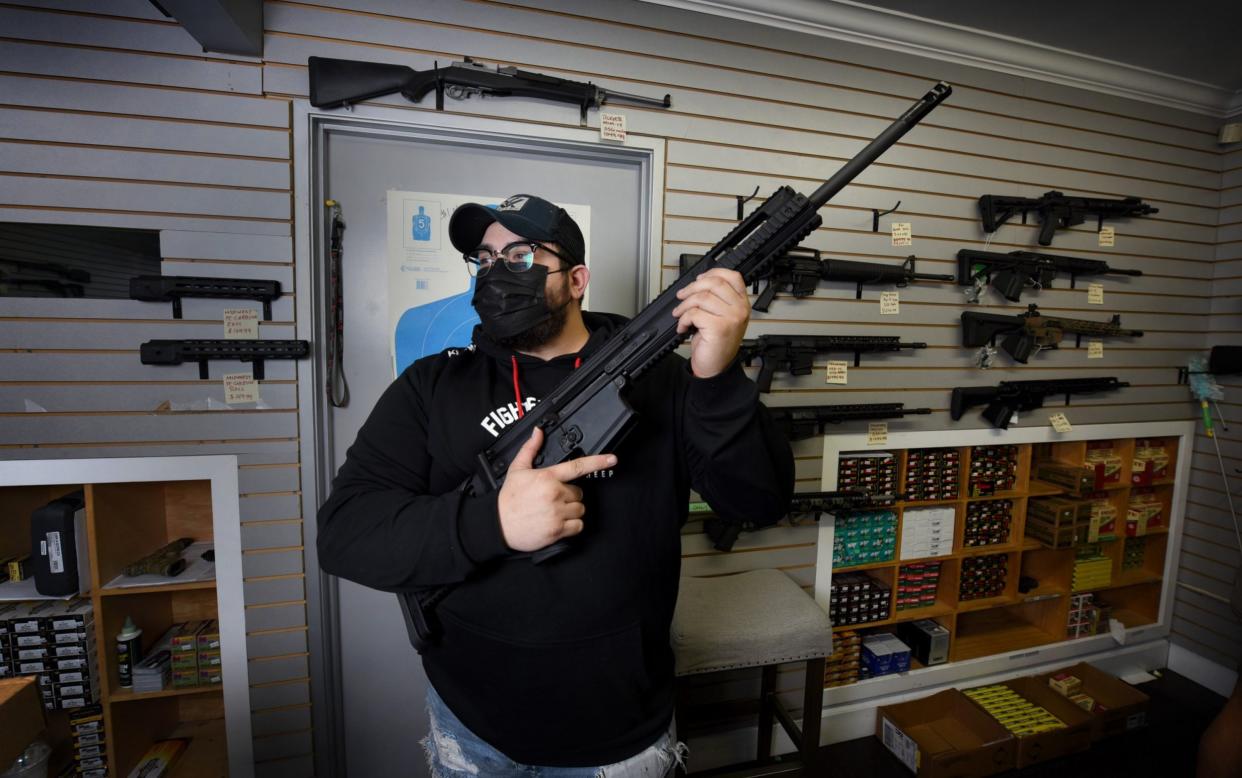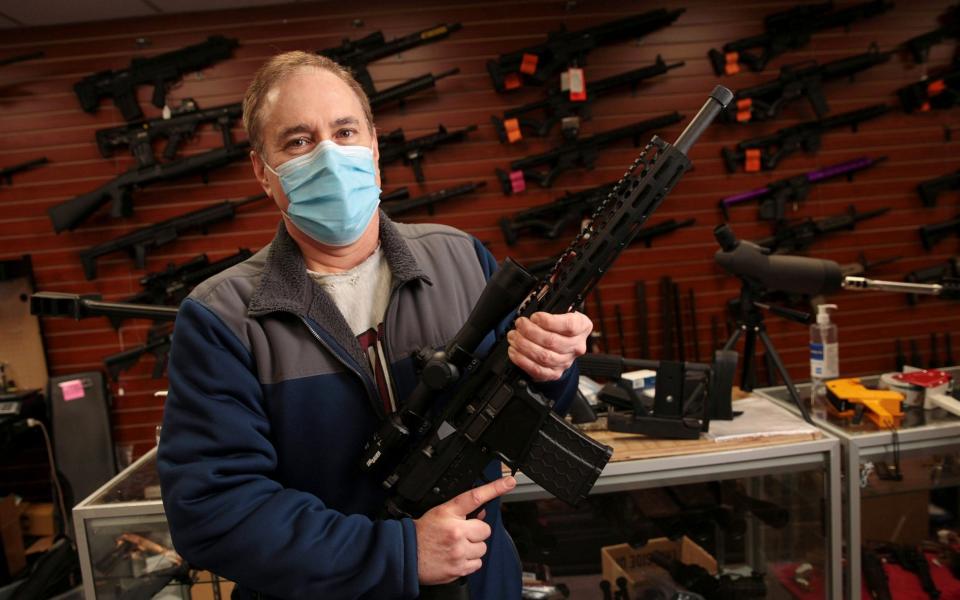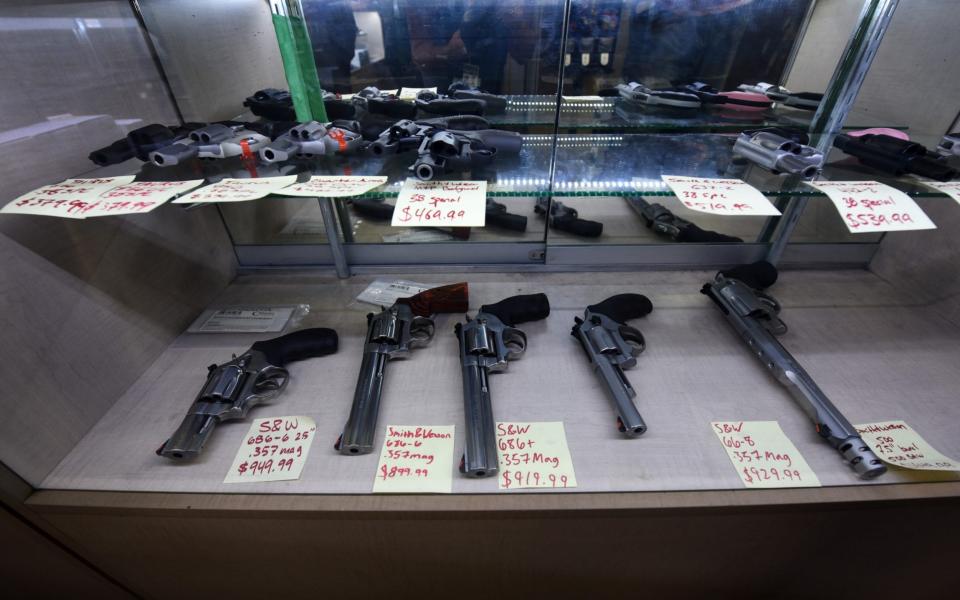‘I need to protect myself in case there is a civil war’: Why middle-class America is arming up

- Oops!Something went wrong.Please try again later.
Brad Vercosa has passed Jimmy’s Sport Shop in Mineola, Long Island countless times, but last Thursday he approached the counter, still in his slippers, to buy his first gun. The construction company owner is one of nearly five million Americans who have purchased their first firearm over the past 12 months, driving what analysts are calling the greatest gun-buying spree in the country’s history.
The seeds were sown with the onset of the pandemic last spring, and grew in response to Black Lives Matter demonstrations and pro-Trump rallies over the summer. But for many of Jimmy Gong’s customers in Mineola – a suburban village 20 miles east of the skyscrapers of Manhattan – the storming of the Capitol by pro-Trump demonstrators on January 6 was the inflection point.
The following day is one of the busiest Gong, 46, can remember, even accounting for a 150 per cent rise in demand. And he expects business to keep booming. After Donald Trump’s impeachment on Wednesday, the FBI warned of possible armed protests and “domestic terrorism”, amid reports of armed far-Right groups planning to gather at all 50 state capitals and in Washington DC in the run-up to Joe Biden being sworn in as president.

Gong’s customers, by contrast, are a diverse microcosm of suburban New Yorkers, holding middle-class jobs. With its historic courthouse and banqueting halls, Mineola doesn’t look like a hotspot for violence, and Vercosa agrees the local mindset is very different from the gun-toting stereotypes of Texas or the “Wild West”.
So why spend close to a thousand dollars on a 12-gauge shotgun?
“It’s just, you never know,” he says. “The climate that we’re in definitely makes me feel like I should protect myself. There might be a civil war, there might be anything.”
It is the same story outside Guns Direct in Burbank, California, where 21-year-old Elliott Smith is waiting to buy his first firearm. He’d been debating the decision with his family for some time before finally being convinced by the scenes from the Capitol. “It’s just my precautionary tool,” he says. “My personal belief is that I wouldn’t use it unless there was a civil war.”
Behind the counter, James Janya, a 41-year-old former Marine, says he’s noticed an “uptick in customers”, though nothing like the scale of the early days of the pandemic, when lines frequently snaked around the block.
By his estimate, around 80 per cent of customers over the past year have been first-time gun buyers, and the number of women has also sharply increased. “Everybody is scared right now,” he says. “Businesses are closing down. Crime is on the rise. People are saying: ‘Defund the police.’ Well, then who’s going to protect me? That’s why people are buying guns.”
Things are quieter at nearby Burbank Ammo & Guns, which employee Eric Fletcher attributes to record sales in 2020. “I think everyone who was looking to buy a gun has already done it,” says the 34 year-old. “The supply of guns and ammunition is still low because of the extreme demand last year.”

This demand is being driven by both sides of the political spectrum. “We see a diverse mixture, including people who come in wearing clothing that says things like: ‘BLM’ or ‘FTP’ [F--- the Police],” says Fletcher.
Down in Austin, Texas, a first-time buyer who asks not to be identified says he’s always found the idea of gun ownership abhorrent – but as a Leftist in a deeply conservative state, he feels increasingly threatened.
“I feel like I didn’t have much of a choice,” he explains. “The people out there who really love guns are now openly talking about killing people like me.”
Indeed, while new gun owners certainly contribute to the record-breaking sales figures, a larger factor may be the stockpiling of guns and ammunition by so-called “super owners.” A study by Harvard and Northeastern University in 2017 indicated that nearly half the guns sold in the US were being purchased by just three per cent of the population.
These are the types who gathered last Saturday at Academy Sports and Outdoors in Austin, an hour before the store opened, queuing in the cold for the chance to buy ammunition, which has been in short supply.

Their faces are obscured by masks, but their hats and bumper stickers indicate Right-wing political affiliations. One wears a shirt with the skull logo from The Punisher – a piece of comic book iconography now associated with extremist groups such as the Three Percenters, which adorned some of the Capitol rioters. Their talk of Biden’s imminent inauguration quickly fades when they realize a journalist has joined them. A manager delivers unwelcome news: “If you’re here for ammo, there’s no truck today,” she says. “It’s like this everywhere I go,” one would-be customer grumbles.
Back in Mineola, during what is usually a quiet hour and a half before closing, Jimmy has sold shotguns, rifles, ammunition and a $2,000 Japanese scimitar. “A gun is becoming more mainstream like buying a car.” he says. “Right now, I think people are in panic mode.”
With additional reporting by Kevin Perry and Matt Valentine
'I know people from tech, fashion and finance who have guns'
Sarah Kennedy

As we watched the riots at the Capitol in Washington DC on our TV in rural Connecticut, my husband and I shared each other’s disbelief. This year has already been the most dramatic in the decade since leaving Britain for the US.
In our area, the Trump candidate narrowly won in the election. Houses on our road flew MAGA flags and one still has the starred cross of the slave-owning confederacy streaming alongside the Stars and Stripes.
Our area is a mix of working class locals and city dwellers with second homes. As the 6pm curfew was declared in DC, I asked my husband if he thought we would be safe in our beds: would the Trump-supporting townies come for us in the night, the liberal grockels? He reminded me that the Americans in our village are generally courteous and kind and more importantly, law-abiding.
Most households assume their neighbours are armed in rural America, deterring all but the most determined criminals. Guns are a way of life with no demographic divide. Locked into boxes on the back of pickup trucks, kept in safes in the hallway or, in some states, allowed to be openly carried on the person.

The local judge, doctor and architect are as likely to hold a gun license as the farmer or power worker.
Have I considered getting a gun? Yes. A nearby British friend and I spent many hours walking our dogs, discussing the pros and cons. We both knew people from tech, finance and fashion who had guns. When a New York publication carried a story on media folk licensed to “pack heat”, I was astonished at how many city gunslingers I knew.
A friend’s husband tells me he has a hunting rifle, but added: “I wouldn’t tell you if I own or am licensed to carry a handgun... that’s the whole point.”

